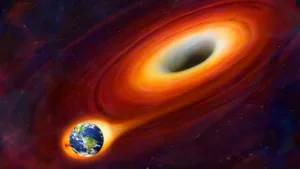When Will a Black Hole Hit Earth?
Black holes are often seen as giant space vacuums that pull in anything nearby. But when will a black hole hit Earth? Is our planet in danger of being swallowed by one?
The truth is, while black holes are very powerful and interesting, the chance of Earth being eaten by one is extremely low. Let’s look at the science of black holes and see if they are a real danger to our planet.
What Is a Black Hole?
A black hole is a place in space where gravity is so strong that even light cannot escape. It happens when a lot of matter is packed into a tiny space, creating a point called a singularity. Around this point is an invisible boundary called the event horizon—once something crosses it, it cannot come back.
Even though black holes have very strong gravity, they are not like monsters that eat everything around them. They only pull in objects that get too close.

Will a Black Hole Ever Swallow Earth?
The question “When will a black hole hit Earth?” is interesting, but the good news is that it is very unlikely to happen. Earth falling into a black hole is almost impossible. This is because a black hole’s gravity is the same as a regular star with the same mass when far away.
Could the Sun Turn Into a Black Hole?
Some people worry if the Sun could become a black hole and pull Earth in. But this won’t happen. The Sun does not have enough mass to turn into a black hole. When it dies, it will turn into a white dwarf, which is much less scary.
But what if we replaced the Sun with a black hole of the same size? Earth and the other planets would still move in the same orbits. The gravity would be the same, so there would be no danger of Earth being sucked in. But without the Sun’s light, our solar system would be cold and dark.
How Likely Is It That a Black Hole Will Hit Earth?
The only way Earth could be swallowed by a black hole is if our planet somehow enters the event horizon of a black hole moving through space. However, this is extremely unlikely. Scientists believe the chances are so low that it will not happen anytime in the future, if ever.
There are many black holes in space, but they are very far apart. The chance of a black hole coming close enough to Earth to be dangerous is almost zero.
Why Are Black Holes Fascinating?
Although it is unlikely that a black hole will hit Earth, black holes are still some of the most fascinating things in space. In May 2022, scientists shared the first picture of Sagittarius A*, which is the black hole at the center of our galaxy. This important discovery has helped us learn more about black holes, but we still have many questions.
Black holes can bend time and space, and matter near them acts in strange ways. They push the limits of what we know about physics.
FAQs About Black Holes and Earth
When will a black hole hit Earth?
It is highly unlikely that a black hole will ever hit Earth. The chances of our planet encountering a wandering black hole are astronomically low, making it a non-existent threat in the foreseeable future.
What would happen if Earth fell into a black hole?
If Earth somehow crossed the event horizon of a black hole, it would be torn apart by tidal forces due to the immense gravity. However, this scenario is incredibly unlikely to happen.
Could the Sun become a black hole and swallow Earth?
No, the Sun does not have enough mass to become a black hole. Instead, it will become a white dwarf when it reaches the end of its life cycle.
Are black holes dangerous to Earth?
While black holes are powerful objects, they are not inherently dangerous to Earth unless we come extremely close to one. The gravitational pull of a black hole is similar to that of any other star of equal mass, so they don’t pose an immediate risk to us.
How many black holes are there in the universe?
There are millions of black holes in the universe, and many more are likely hidden within galaxies. However, most are far from Earth, and none are close enough to pose a danger.
Conclusion
So, when will a black hole hit Earth? The answer is: probably never. Black holes are not a threat to our planet. Their gravitational pull is not different from that of any other celestial body with the same mass. Earth’s chances of ever being swallowed by a black hole are slim to none. And there’s no need to worry about this cosmic event happening in the near or distant future.
Black holes remain fascinating mysteries of the universe. But for now they are far away and Earth remains safe.

